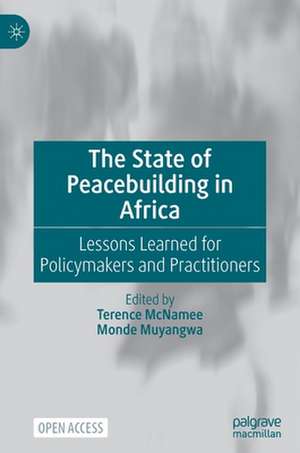The State of Peacebuilding in Africa: Lessons Learned for Policymakers and Practitioners
Editat de Terence McNamee, Monde Muyangwaen Limba Engleză Hardback – 3 noi 2020
| Toate formatele și edițiile | Preț | Express |
|---|---|---|
| Paperback (1) | 359.93 lei 6-8 săpt. | |
| Springer International Publishing – 3 noi 2021 | 359.93 lei 6-8 săpt. | |
| Hardback (1) | 432.88 lei 6-8 săpt. | |
| Springer International Publishing – 3 noi 2020 | 432.88 lei 6-8 săpt. |
Preț: 432.88 lei
Nou
Puncte Express: 649
Preț estimativ în valută:
82.85€ • 85.38$ • 69.95£
82.85€ • 85.38$ • 69.95£
Carte tipărită la comandă
Livrare economică 03-17 martie
Preluare comenzi: 021 569.72.76
Specificații
ISBN-13: 9783030466350
ISBN-10: 3030466353
Pagini: 273
Ilustrații: XIX, 431 p. 9 illus. in color.
Dimensiuni: 148 x 210 mm
Greutate: 0.69 kg
Ediția:1st ed. 2021
Editura: Springer International Publishing
Colecția Palgrave Macmillan
Locul publicării:Cham, Switzerland
ISBN-10: 3030466353
Pagini: 273
Ilustrații: XIX, 431 p. 9 illus. in color.
Dimensiuni: 148 x 210 mm
Greutate: 0.69 kg
Ediția:1st ed. 2021
Editura: Springer International Publishing
Colecția Palgrave Macmillan
Locul publicării:Cham, Switzerland
Cuprins
1. Introduction.- 2. Learning Lessons from Peace Operations in Africa.- 3. The Economics of Peacebuilding: International Organizations for Dealing with Victor and Vanquished.- 4. Religion and Peacebuilding in Sub-Saharan Africa.- 5. Field Reflections on Post-Conflict Reconstruction: The Social Imperative of Disarmament, Demobilization, and Reintegration.- 6. United Nations Peacekeeping and Human Rights, Refugees, and Internal Displacement.- 7. Sustaining Women, Peace, and Security: The Role of UN Peacekeeping in Africa.- 8. Local Peace Committees and Grassroots Peacebuildiing in Africa.- 9. Three Decades of Disarmament, Demobilization, Demilitarization, Rehabilitation and Reintegration of Ex-Combatants in Africa: Lessons Learned and Challenges Ahead.- 10. The Changing Nature of Elections in Africa: Impact on Peacebuilding.- 11. Contributions of Early Warning to the African Peace and Security Architecture: The Experience of the West Africa Network for Peacebuilding (WANEP).- 12. The African Union in Peacebuilding in Africa.- 13. Trends in SADC Mediation and Long-Term Conflict Mediation.- 14. The International Criminal Court's Impact on Peacebuilding in Africa.- 15. Humanitarian Action and Peacebuilding: Incompatible or Complementary?.- 16. Peace Management and Conflict Resolution: A PRactitioner's Perspective.- 17. Peacebuilding as State-Building? Lessons from the Democratic Republic of the Congo.- 18. Violence, Peacebuilding and Elite Bargains in Mozambique since Independence.- 19. The Dog That Did Not Bark: Why Has Sierra Leone Not Returned to War After Peacekeepers Left?.- 20. Lessons in Failure: Peacebuilding in Sudan/South Sudan.- 21. Such a Long Journey: Peacebuilding After Genocide in Rwanda.- 22. Crisis and Transition in the Sahel.- 23. Conclusion.
Recenzii
“This edited volume is a bracing read due to its description of the many failings of peacebuilding in Africa, and it offers, if not always systematically, useful thoughts on how peacebuilding might be pointed in a direction that takes account of politics and viability.” (David Harris, International Affairs, Vol. 97 (4), 2021)
Notă biografică
Terence McNamee is Global Fellow at the Woodrow Wilson International Center Scholars, based in South Africa. Educated in his native Canada and the UK, he has written and worked on development, governance and security issues for more than two decades, mainly in Africa.
Monde Muyangwa is Director of the Africa Program at the Woodrow Wilson International Center for Scholars. She previously served as Academic Dean of the Africa Center for Strategic Studies at the National Defense University, and as Director of Research and Policy at the National Summit on Africa, all in the USA.
Monde Muyangwa is Director of the Africa Program at the Woodrow Wilson International Center for Scholars. She previously served as Academic Dean of the Africa Center for Strategic Studies at the National Defense University, and as Director of Research and Policy at the National Summit on Africa, all in the USA.
Textul de pe ultima copertă
This open access book on the state of peacebuilding in Africa brings together the work of distinguished scholars, practitioners, and decision makers to reflect on key experiences and lessons learned in peacebuilding in Africa over the past half century. The core themes addressed by the contributors include conflict prevention, mediation, and management; post-conflict reconstruction, justice and Disarmament Demobilization and Reintegration; the role of women, religion, humanitarianism, grassroots organizations, and early warning systems; and the impact of global, regional, and continental bodies. The book's thematic chapters are complemented by six country/region case studies: The Democratic Republic of Congo, Rwanda, Sierra Leone, Sudan/South Sudan, Mozambique and the Sahel/Mali. Each chapter concludes with a set of key lessons learned that could be used to inform the building of a more sustainable peace in Africa. The State of Peacebuilding in Africa was born out of the activities of the Southern Voices Network for Peacebuilding (SVNP), a Carnegie-funded, continent-wide network of African organizations that works with the Wilson Center to bring African knowledge and perspectives to U.S., African, and international policy on peacebuilding in Africa. The research for this book was made possible by a grant from Carnegie Corporation of New York.
Monde Muyangwa is Director of the Africa Program at the Woodrow Wilson International Center for Scholars. She previously served as Academic Dean of the Africa Center for Strategic Studies at the National Defense University, and as Director of Research and Policy at the National Summit on Africa, all in the USA.
Caracteristici
Bring together high-level experts from both Africa and the international community to discuss the evolution and current state of peacebuilding in Africa Produces a unique analysis of how development of peacebuilding programs and policy in Africa Proposes to contribute to the literature by drawing on experiences and conditions across African states to understand peacebuilding in post conflict societies
